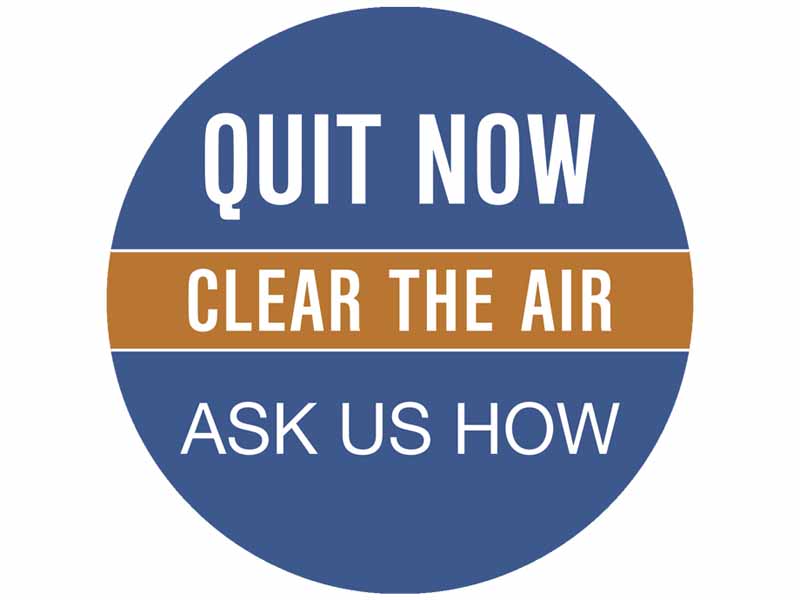AAFP Recruiting for Ask and Act Office Champions Project
Tobacco Prevention, Cessation Initiative Focuses on Youth Use of ENDS
May 08, 2019 12:20 pm Chris Crawford – The AAFP wants you and your practice to consider participating in its new yearlong Reimagining Ask and Act Office Champions Project.
The Academy is currently recruiting 20 family medicine practices to participate in the initiative, which seeks to build on the success of the AAFP's Ask and Act Tobacco Cessation Program by introducing systems changes, training, educational materials and practice resources specific to electronic nicotine delivery systems, with a focus on youth prevention and cessation.
Michael Monroe, population health strategist in the AAFP's Health of the Public and Science Division, told AAFP News about the many benefits of participating in the project.
The AAFP will provide materials, education and direct technical support to participating practices for strategic planning to address the e-cigarette epidemic among youth and help adults quit.
Practices will also receive $5,000 to cover time and administrative costs associated with the project, he said.
Story Highlights
The AAFP is recruiting 20 family medicine practices to participate in its yearlong Reimagining Ask and Act Office Champions Project.
The AAFP will provide materials, education and direct technical support to participating practices for strategic planning to address the e-cigarette epidemic among youth and help adults quit.
Practices will participate in various activities over the course of the project, culminating in a wrap-up teleconference in July 2020.
"Last, but not least, participating practices will work directly with the AAFP to help bring the Ask and Act program into the 21st century and continue family medicine's legacy as a leader in the changing landscape of tobacco cessation," Monroe said.
The deadline to apply to participate is May 31.
Participating practices will be announced by late June, with the project running from July 1 through June 2020.
This project is sponsored by the AAFP with support from the CVS Health Foundation.
Additional Project Details
Practices interested in participating in the project are required to have at least one active AAFP member on staff and provide care for patients ages 13-24.
Interested health care teams need to identify one physician champion and one office champion who will help manage the responsibilities of the project, including planning and evaluation.
Practices will complete a brief practice assessment to evaluate current efforts on youth prevention and cessation.
Additionally, practices must be using an EHR system that they are able to modify and from which they can extract specific data.
Practices chosen to participate will be expected to
- take part in an online orientation in June,
- present an overview of the project to practice physicians and staff,
- hold monthly check-ins via teleconference with the AAFP,
- complete monthly EHR data pulls,
- identify and implement changes to better integrate tobacco and ENDS prevention and cessation activities into daily office routines, and
- create a practice culture that encourages continuous improvement.
Finally, practices' project champions will participate in a wrap-up teleconference when the project ends in July 2020 to discuss lessons learned.
Family Physician Expert's Perspective
Thomas Houston, M.D., of Dublin, Ohio, a former chair of the AAFP Commission on Health of the Public and Science and of the Academy's now-dissolved Smoking Cessation Advisory Committee, told AAFP News that during the past five years, adolescent use of e-cigarettes has skyrocketed.
"Today, more high school students use e-cigarettes than conventional cigarettes, and the previous downward trend in youth tobacco use has halted because of the uptake of e-cigarettes," he said. "Curiosity, low cost, ease of use where smoking is not permitted, enticing flavors, friends' use and exposure to advertising on social media and other platforms are all reasons that youth try electronic cigarettes."
Houston went on to note that many adolescents don't understand that the most popular ENDS product, JUUL, contains as much nicotine as a pack of cigarettes in each of its "pods."
"Indeed, many adolescents don't realize they are inhaling nicotine at all; however, nicotine dependence is a worrisome potential outcome of ENDS use," he said.
In addition, long-term health effects of ENDS remain poorly understood.
"E-cigarette use by youth also appears to be a risk factor for subsequent conventional smoking, and it's very important for family physicians to educate adolescents and their parents about the hazards of e-cigarette use and to provide cessation support for youth," said Houston.
The new Reimagining Ask and Act Office Champions Project is utilizing updated materials and methods that include e-cigarettes, which were not part of the tobacco use landscape when the program was originally created.
"The new approach will help family physicians use proven techniques to discuss e-cigarette use with both adult and adolescent patients," said Houston. "Helping our patients stop tobacco use with counseling and FDA-approved pharmacotherapy is a key element of Ask and Act/Office Champions. The updated project will help us provide cessation support to electronic cigarette users as well."
Final Thoughts
According to Monroe, the Reimagining Ask and Act Office Champions Project's ultimate goal is to find the most effective strategies to increase the number of patients in family physicians' practices being asked about their use of tobacco products -- including ENDS such as JUULs and e-cigarettes -- and helping them quit.
"To reach the goal of fewer patients starting and more patients quitting, we need to work directly with family physicians to figure out what their needs are related to tobacco prevention and cessation -- including ENDS prevention and cessation," he said. "From there, we can work to develop and promote the systems changes, training, educational materials and practice resources they need to combat this important public health issue."
